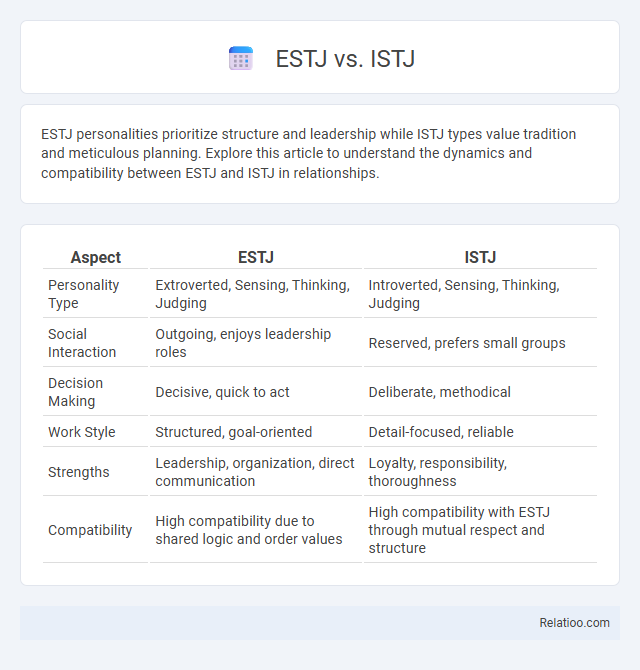ESTJ personalities prioritize structure and leadership while ISTJ types value tradition and meticulous planning. Explore this article to understand the dynamics and compatibility between ESTJ and ISTJ in relationships.
Table of Comparison
| Aspect | ESTJ | ISTJ |
|---|---|---|
| Personality Type | Extroverted, Sensing, Thinking, Judging | Introverted, Sensing, Thinking, Judging |
| Social Interaction | Outgoing, enjoys leadership roles | Reserved, prefers small groups |
| Decision Making | Decisive, quick to act | Deliberate, methodical |
| Work Style | Structured, goal-oriented | Detail-focused, reliable |
| Strengths | Leadership, organization, direct communication | Loyalty, responsibility, thoroughness |
| Compatibility | High compatibility due to shared logic and order values | High compatibility with ESTJ through mutual respect and structure |
Understanding ESTJ and ISTJ: Key Differences
ESTJ and ISTJ personalities differ primarily in their approach to problem-solving, with ESTJs favoring assertive decision-making and external organization, while ISTJs rely on careful analysis and internal logic. Understanding these key differences enables you to tailor your problem-solving strategies, leveraging ESTJ's leadership and ISTJ's methodical precision. Both types value structure, yet ESTJs prioritize efficiency and quick action, whereas ISTJs focus on accuracy and consistency.
Core Personality Traits: ESTJ vs ISTJ
ESTJ personalities demonstrate strong leadership skills, decisiveness, and practical problem-solving driven by external logic and organization, while ISTJ individuals rely on deep internal analysis, methodical approaches, and dependability when addressing challenges. ESTJs excel in quick decision-making and directing teams through structured plans, whereas ISTJs prioritize accuracy, thoroughness, and consistency based on past experience and factual data. Both types value practicality and reliability but differ in their external expression of problem-solving and resource management.
Decision-Making Styles: Logic vs Structure
ESTJs rely on decisive, logic-driven decision-making that prioritizes efficiency and results, while ISTJs emphasize structured, methodical approaches grounded in proven routines and consistency. Your problem-solving style will vary: ESTJs favor swift action based on objective data, whereas ISTJs choose deliberate steps aligned with established systems. Both types excel in logical analysis but differ in balancing innovation with respect for tradition when tackling challenges.
Communication Approaches of ESTJ and ISTJ
ESTJ leaders utilize direct, assertive communication to drive efficiency and decision-making, often prioritizing clear expectations and immediate feedback. ISTJ individuals prefer structured, detail-oriented dialogue, emphasizing accuracy and consistency to solve problems methodically. Your choice between ESTJ and ISTJ communication styles impacts collaboration and the effectiveness of problem-solving strategies in team environments.
Leadership Qualities and Work Habits
ESTJ leaders excel in organizing teams and making decisive choices, demonstrating strong leadership qualities through their assertiveness and focus on efficiency. ISTJ individuals showcase dependable work habits and meticulous problem-solving skills, valuing tradition and practical solutions that sustain long-term success. Your leadership style can benefit from blending the ESTJ's proactive management with the ISTJ's careful analysis to enhance team performance and address challenges effectively.
Social Interaction and Relationship Dynamics
ESTJ personalities excel in problem-solving through decisive social interaction, often taking charge in group dynamics to achieve efficient outcomes. ISTJs approach problem-solving with methodical precision, relying on routines and past experiences, which supports stable and trustworthy relationships. Your ability to balance the ESTJ's assertive engagement with the ISTJ's thoughtful analysis enhances collaborative decision-making and deepens interpersonal connections.
Coping with Stress: ESTJ vs ISTJ
ESTJs tend to cope with stress by taking immediate, decisive action and organizing their environment to regain control, relying on their strong leadership and extraverted thinking functions. ISTJs manage stress through careful analysis, detailed planning, and adhering to established routines, drawing on their introverted sensing to maintain stability and order. Both types address problem-solving under stress, but ESTJs are more proactive and assertive, while ISTJs prefer a methodical and rule-based approach.
Career Preferences and Professional Strengths
ESTJ individuals thrive in structured environments where leadership and decision-making are essential, showing strong organizational skills and a preference for clear rules in career paths like management or administration. ISTJ professionals excel in roles requiring meticulous attention to detail, reliability, and adherence to established procedures, making them ideal for careers in accounting, law enforcement, or engineering. Your problem-solving approach varies, with ESTJs favoring pragmatic, outcome-oriented solutions, while ISTJs rely on logical analysis and consistency to address challenges effectively.
Conflict Resolution Styles Compared
ESTJ and ISTJ conflict resolution styles differ primarily in approach and execution, with ESTJs favoring direct, decisive action rooted in extraverted thinking, while ISTJs rely on careful analysis and internal consistency supported by introverted sensing. ESTJs tend to address conflicts openly and assertively, seeking quick solutions that maintain order, whereas ISTJs prefer measured, step-by-step problem-solving that upholds tradition and established protocols. Understanding these differences improves team dynamics by aligning resolution strategies with personality-driven preferences in managing disagreements.
Growth Paths for ESTJ and ISTJ Personalities
ESTJ personalities thrive in structured environments, enhancing problem-solving by leveraging their decisiveness and organizational skills, which foster effective leadership growth paths. ISTJ individuals excel through methodical analysis and reliability, developing growth by deepening expertise and applying practical solutions to complex issues. Both types benefit from cultivating adaptability and emotional intelligence to expand their problem-solving capabilities and accelerate personal development.

Infographic: ESTJ vs ISTJ
 relatioo.com
relatioo.com